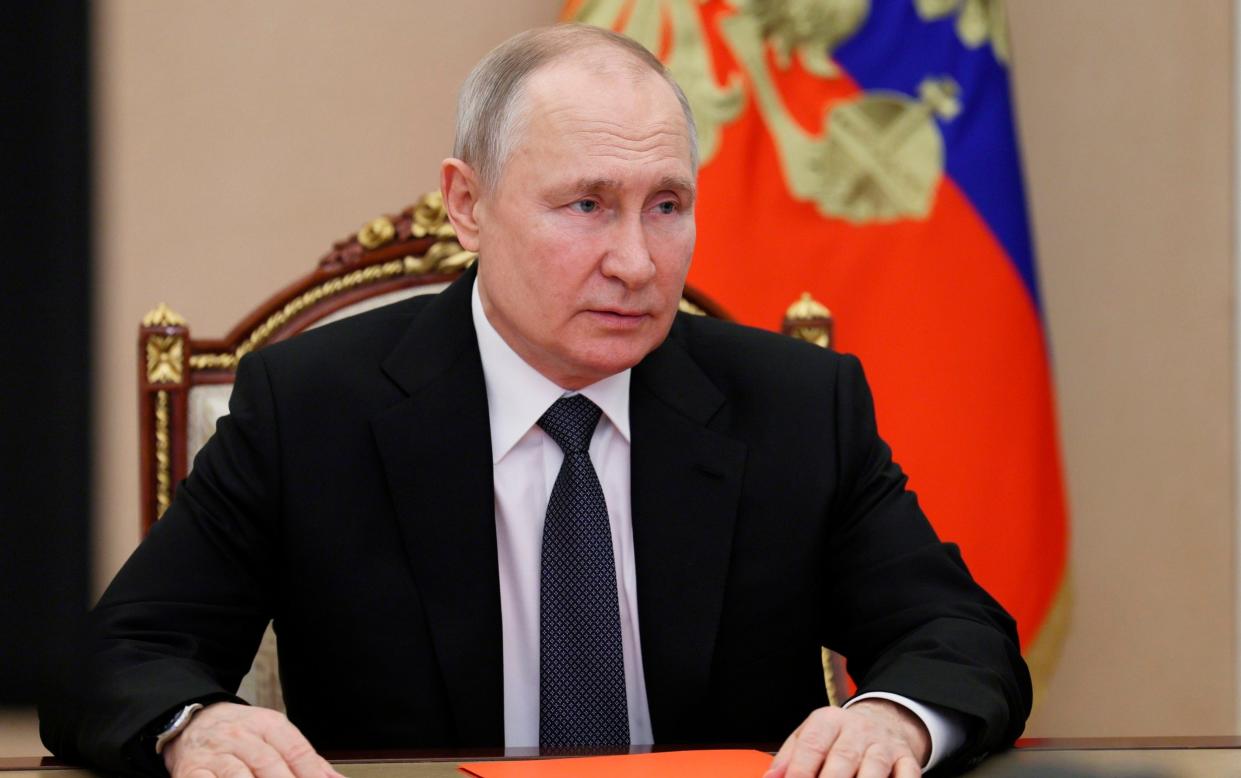Tougher sanctions will leave Putin with nowhere to hide

- Oops!Something went wrong.Please try again later.
For a year now, Britain and its NATO partners have needed to provide an off-ramp for Russia’s satellite states, not only for the good of their burgeoning freedom and democracy, but because without isolating Russia from its military and economic alliances Putin’s war machine is not isolated at all. Unfortunately, that need has not been met.
New evidence released in recent weeks shows why it is more important than ever to act. Sanctions simply are not working as they should. The Kremlin has been able to swiftly and neatly bypass nearly every barrier placed in its way.
Countries that are members of Russia’s copycat version of the EU – a five-country single market and customs union called the Eurasian Economic Union (EAEU) – along with other erstwhile allies are acting as sieves through which materiel and technology for the Kremlin’s war effort are passing.
The statistics are stark: Russia’s own GDP declined by around 3 per cent in 2022; yet countries within its economic sphere of influence are experiencing booms so fantastical it can only be through connivance with the Russian authorities. Georgia’s GDP is up around 10 per cent in the last year. Economic growth in Kyrgyzstan is up 7.2 per cent. But the most absurd is Armenia, whose 13 per cent economic expansion in only 12 months makes it a candidate for third-fastest growing economy in the world.
According to the World Bank, an influx to the country of ICT and banking specialists – young peace-minded Russians who have no desire to die early in Putin’s illegal war – explains the growth. Indeed, now youthful Russians are unable to gain visas for Britain and Europe it is hardly a surprise that they relocate to a long-term Russian ally where cultural and religious traditions are so similar. The same is the case with Serbia – not in the EAEU – but orthodox Christian and familiar and therefore another safe landing zone. In total it is estimated upward of 700,000 Russians have left.
Yet none of this explains the trade flows. The German Centre for the South Caucasus, a Berlin-based think-tank revealed last month that exports from Germany to Armenia rose from €178 million to €505 million in 2022. That’s from just one EU country. Exports from Armenia to the EU in the same twelve months doubled from €753 million to €1.3 billion. With a population of barely three million and a GDP per capita of less than a tenth of the average Briton, these are impossible numbers. But they are real. What is clear is that imports to and exports from Russia – which are tariff and duty free between all EAEU countries – are being near-seamlessly diverted to the outside world via their satellite states.
Fortunately, there has only been twelve months of this circumvention, and there is some evidence it is starting to be cauterised. At the beginning of March two American citizens were arrested for skirting US sanctions to sell sophisticated aviation equipment to Russia through third countries, including Armenia.
As for the Germans – serious laggards in so many aspects of this war from cutting off Russian gas pipelines to supplying tanks to Ukraine – they are also now alive to this challenge. Indeed, whether by coincidence or design, only days before Armenian prime minister earlier this month met with German Chancellor Olaf Scholz, the latter’s economy minister Robert Halbeck unveiled a plan to clamp down the “sanctions evasion” by companies supplying Russia via third countries.
Germany’s attempts to take the initiative by forcing businesses to provide transparent “end-use statements” for exported products should be replicated by Britain. And while our country may not equal Germany’s manufacturing power, we more than match them in financial services, where similar requirements to produce proof of end-use should be a necessity for financing and facilitation.
Britain must also use its diplomatic credibility that rivals that of any country in Europe to apply both carrot and stick to countries such as Armenia. Other former Soviet satellites such as Azerbaijan and the three Baltic states have since their independence escaped from under the Kremlin’s grasp – the former now a reliable supplier of an alternative to Russian gas, and the latter members of NATO and the EU. All four have managed this despite sharing land borders with Russia and significant Russian-speaking populations.
With no land border and no less economic connections to Russia than the Baltic states, Armenia has little excuse when allowing itself to act as a third-country transit point.
For Britain to work with Germany and others to close sanctions evasion may not make Ukraine win this conflict, but it will help Russia lose it. The off-ramp of friendship alone is clearly not enough to stop those who wish to make money from Putin’s war. Therefore, it must be combined with a slippery slope that leads to consequences for those who collude to profit from it.
Mat Whatley is a British army veteran. He is also the former head of the Organization for Security and Co-operation in Europe (OSCE) in Donetsk, Ukraine, the EU Monitoring Mission in Georgia, and an OSCE spokesman in former Yugoslavia

